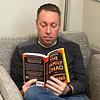Take a photo of a barcode or cover
1.64k reviews for:
David Y Goliat: Desvalidos, Inadaptados Y El Arte de Luchar Contra Gigantes / David and Goliath
Malcolm Gladwell
1.64k reviews for:
David Y Goliat: Desvalidos, Inadaptados Y El Arte de Luchar Contra Gigantes / David and Goliath
Malcolm Gladwell
Typical Gladwell - making the obvious "unobvious" and the counterintuitive "tuitive." This one, however, doesn't seem as coherent, well-put-together, or as well-argued-toward-a-single-point as his other books. Still a lot of to be interested in here...
Read for a writing and rhetoric course. I don’t normally review books I read for school but in case you find this and are considering reading it—note that (like Gladwell’s other book, Blink) we read this book specifically to talk about bad argumentation.
Another winner from Gladwell. It seemed to end a bit abruptly, no final chapter to wrap things up, but willing to overlook for stellar and such interesting writing!
Gladwell weaves together a compelling story here but I think something is missing. In the first 2/3 of the book, I was following his thesis as he threaded together different stories about advtanges that are actually disadvantages and vice versa. The final 1/3 was more emotionally resonant due to much heavier subject matter, and was even inspiring (and made me do some research to find out that Gladwell is indeed a Christian), but I lost sight of the thesis. Maybe that’s because I listened to the audio, but I just felt like he didn’t use the final part of this to really drive his point home and I’m not sure why not. Still, it was very interesting and I’m giving it 3.5 stars rounded up.
informative
inspiring
reflective
fast-paced
I'm a big fan of Malcolm Gladwell. I like some of his previous books better than this one, but there were still a lot of interesting ideas in this book.
informative
reflective
medium-paced
Lot of food for thought here. Favorite quote: "The reasonable man adopts himself to the world: the unreasonable one persists in trying to adapt the world to himself. Therefore all progress depends on the unreasonable man." George Bernard Shaw
What a fascinating book! This is outside-the-box thinking that will compel you to look differently at conclusions you would otherwise take for granted. That seems to be the overarching takeaway that the author intended, and with that in mind, Gladwell has succeeded. The book explores a wide variety of topics, including the possibility that Goliath was actually the underdog when he met David, that people with dyslexia might actually have an advantage over those who do not, that smaller class sizes in elementary schools could turn out to be a disadvantage for both students and teachers, and that attending a more prestigious university might make you less likely to succeed in your chosen field.
I really liked the diversity of topics included in this edition of Gladwell's writings, and I also liked the way he continues a thread of thought by tying it together even several chapters later as he discusses a seemingly unrelated topic. Fans of biographical sketches will enjoy this book, because there is an opportunity in each chapter to learn a life lesson of someone you might not otherwise read about; most of the people in this book are not famous.
However, some of the conclusions he jumps to seem unfounded, and the examples and people that he uses to support his assertions are perhaps better considered as exceptions, and not rules. When I finished the first two or three chapters of this book, I was so fascinated by what I was reading that I wondered how the rating could be anything less than 5 stars. (At the time of this review, the rating is actually below 4 stars on goodreads, although it is 4.5 stars on Amazon.)
I've read some of the negative reviews written about this book, claiming that the information he is presenting is skewed, as if Gladwell is trying to state that his examples are without fault. I don't believe that this is the premise of his book. As a reader, I suggest that you instead approach this book with the mindset that the author is simply going to provide you with some tools for interpreting what everyone else may unequivocally accept as "fact" and that he is simply offering some possibilities that illustrate that things are not always as they seem on the surface. If you can do that with an open mind, then you will at least walk away from this book with a greater appreciation for considering a different perspective the next time you face a question that needs to be answered. And if a book can do that for you, you have the opportunity to gain knowledge both now and later.
I really liked the diversity of topics included in this edition of Gladwell's writings, and I also liked the way he continues a thread of thought by tying it together even several chapters later as he discusses a seemingly unrelated topic. Fans of biographical sketches will enjoy this book, because there is an opportunity in each chapter to learn a life lesson of someone you might not otherwise read about; most of the people in this book are not famous.
However, some of the conclusions he jumps to seem unfounded, and the examples and people that he uses to support his assertions are perhaps better considered as exceptions, and not rules. When I finished the first two or three chapters of this book, I was so fascinated by what I was reading that I wondered how the rating could be anything less than 5 stars. (At the time of this review, the rating is actually below 4 stars on goodreads, although it is 4.5 stars on Amazon.)
I've read some of the negative reviews written about this book, claiming that the information he is presenting is skewed, as if Gladwell is trying to state that his examples are without fault. I don't believe that this is the premise of his book. As a reader, I suggest that you instead approach this book with the mindset that the author is simply going to provide you with some tools for interpreting what everyone else may unequivocally accept as "fact" and that he is simply offering some possibilities that illustrate that things are not always as they seem on the surface. If you can do that with an open mind, then you will at least walk away from this book with a greater appreciation for considering a different perspective the next time you face a question that needs to be answered. And if a book can do that for you, you have the opportunity to gain knowledge both now and later.





